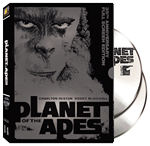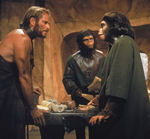Planet of the Apes:35th Anniversary Widescreen Edition
Picture *** 1/2
Sound ** 1/2
Film *** 1/2
When the screenwriters of a script titled Monkey Planet bounced around Hollywood in the mid-1960s, pitching their tale of a world turned upside down, they must have attracted some wry smiles and blank stares. A society run by apes? Actors in ape suits or funky makeup? People will laugh. It'll never work. We'll lose our shirts.
 20th Century Fox chief Richard Zanuck didn't laugh. Filmed in the wilds near Los Angeles on what today would be a laughable budget (less than $7 million) and a tight shooting schedule, Monkey Planet became Planet of the Apes and a science-fiction classic. It also turned into a major franchise, spawning four sequels ranging from the so-so to the dismal, two television series (one live, one animated), and a poorly received 2001 remake from director Tim Burton.
20th Century Fox chief Richard Zanuck didn't laugh. Filmed in the wilds near Los Angeles on what today would be a laughable budget (less than $7 million) and a tight shooting schedule, Monkey Planet became Planet of the Apes and a science-fiction classic. It also turned into a major franchise, spawning four sequels ranging from the so-so to the dismal, two television series (one live, one animated), and a poorly received 2001 remake from director Tim Burton.
Based on a novel by French writer Pierre Boulle, Planet of the Apes tells a story of Earth astronauts exploring deep space. They crash-land on a planet dominated by simians. There are humans there, but they're little more than mute, wild primitives. Curiously, our supposedly bright astronauts find nothing unusual in discovering life forms on a distant world that are identical to those of Earth. But the film is more thoughtful than it is an action-adventure (a priority turned on its head in that 2001 remake), and takes more than a subtle stab at parodying human foibles, closed-minded prejudice, and religious ideology masquerading as science. It's no surprise to learn that the writer and host of the original The Twilight Zone, Rod Serling, was involved in the script. Today, when most of us have been exposed to dozens of films with variations on these themes, it all seems a bit been-there, done-that. In 1968, it was more eye-opening.
 There are also the plot's famous surprises, which I won't give away to the two readers who haven't seen the film or heard about them. I'll only note that today we can imagine that these surprises might easily be the result not of historical events made clear in the film, but of more natural phenomena, such as major climactic shifts or even an extinction-level—or near–extinction-level—event. But then there would be no "lesson."
There are also the plot's famous surprises, which I won't give away to the two readers who haven't seen the film or heard about them. I'll only note that today we can imagine that these surprises might easily be the result not of historical events made clear in the film, but of more natural phenomena, such as major climactic shifts or even an extinction-level—or near–extinction-level—event. But then there would be no "lesson."
None of this takes away from Planet of the Apes. It seems a bit unpolished around the edges compared to a major Hollywood film today, and the frequent use of zoom shots in the otherwise pristine photography is reminiscent of cheap 1960s TV productions. Otherwise, it holds up remarkably well. And the new video transfer made for this release is superb—right up there with some of the best transfers of recent films. Most shots are sharp, the color is crisp (though the photography and lighting are fairly flat, which makes for a less challenging transfer), and there's almost no obvious edge enhancement. The film was first released on DVD in 2001, both as a single disc and in a boxed set together with the four sequels. But there's no contest on the picture quality. That earlier version (at least the one I've seen, the single-disc release) is a straight letterbox (non-anamorphic) transfer. If you have a widescreen set, this new release wins hands down.
 The sound is more obviously dated. But the dialog is clean, and Jerry Goldsmith's classic score holds up reasonably well at low and medium levels, though at high levels the recording's restricted dynamic range becomes evident.
The sound is more obviously dated. But the dialog is clean, and Jerry Goldsmith's classic score holds up reasonably well at low and medium levels, though at high levels the recording's restricted dynamic range becomes evident.
The extras are enticing, though perhaps not to those who own that comprehensive boxed set from 2001. The two commentary tracks are new—one from composer Jerry Goldsmith, the other from actors Roddy McDowell, Natalie Trundy, and Kim Hunter, producer Richard Zanuck, and makeup artist John Chambers. But they're a little thin on content, with long silences between occasionally interesting comments. The prize extra (also included on the earlier boxed set, though not on the 2001 single-disc release) is a first-rate, two-hour documentary on the making of the entire series.—TJN
- Log in or register to post comments




